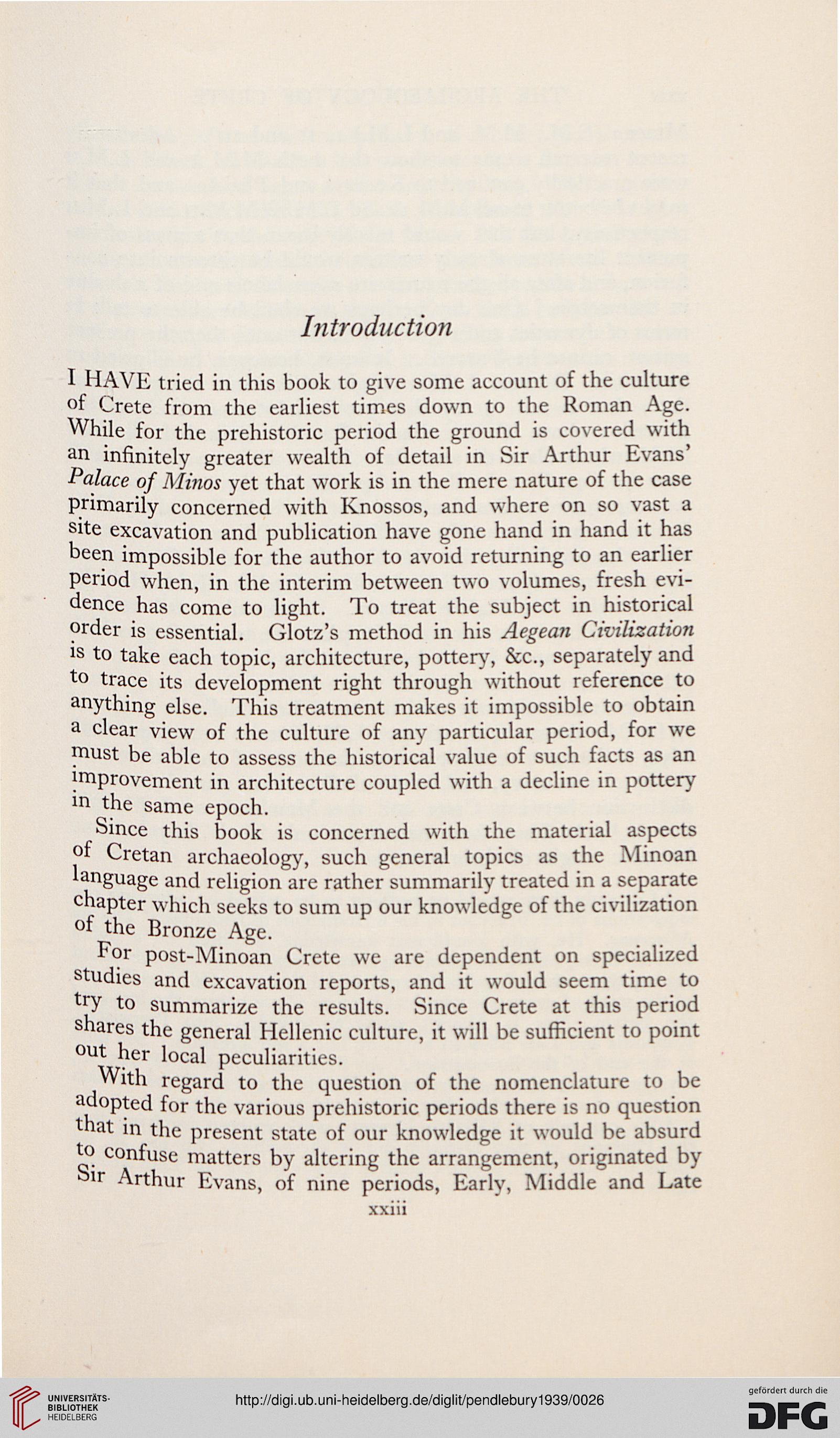Introduction
I HAVE tried in this book to give some account of the culture
of Crete from the earliest times down to the Roman Age.
While for the prehistoric period the ground is covered with
an infinitely greater wealth of detail in Sir Arthur Evans'
Palace of Minos yet that work is in the mere nature of the case
primarily concerned with Knossos, and where on so vast a
site excavation and publication have gone hand in hand it has
been impossible for the author to avoid returning to an earlier
period when, in the interim between two volumes, fresh evi-
dence has come to light. To treat the subject in historical
order is essential. Glotz's method in his Aegean Civilization
is to take each topic, architecture, potter}', &c, separately and
to trace its development right through without reference to
anything else. This treatment makes it impossible to obtain
a clear view of the culture of any particular period, for we
must be able to assess the historical value of such facts as an
improvement in architecture coupled with a decline in pottery
m the same epoch.
Since this book is concerned with the material aspects
°f Cretan archaeology, such general topics as the Minoan
language and religion are rather summarily treated in a separate
chapter which seeks to sum up our knowledge of the civilization
of the Bronze Age.
For post-Minoan Crete we are dependent on specialized
studies and excavation reports, and it would seem time to
try to summarize the results. Since Crete at this period
shares the general Hellenic culture, it will be sufficient to point
out her local peculiarities.
With regard to the question of the nomenclature to be
adopted for the various prehistoric periods there is no question
that in the present state of our knowledge it would be absurd
to confuse matters by altering the arrangement, originated by
Sir Arthur Evans, of nine periods, Early, Middle and Late
I HAVE tried in this book to give some account of the culture
of Crete from the earliest times down to the Roman Age.
While for the prehistoric period the ground is covered with
an infinitely greater wealth of detail in Sir Arthur Evans'
Palace of Minos yet that work is in the mere nature of the case
primarily concerned with Knossos, and where on so vast a
site excavation and publication have gone hand in hand it has
been impossible for the author to avoid returning to an earlier
period when, in the interim between two volumes, fresh evi-
dence has come to light. To treat the subject in historical
order is essential. Glotz's method in his Aegean Civilization
is to take each topic, architecture, potter}', &c, separately and
to trace its development right through without reference to
anything else. This treatment makes it impossible to obtain
a clear view of the culture of any particular period, for we
must be able to assess the historical value of such facts as an
improvement in architecture coupled with a decline in pottery
m the same epoch.
Since this book is concerned with the material aspects
°f Cretan archaeology, such general topics as the Minoan
language and religion are rather summarily treated in a separate
chapter which seeks to sum up our knowledge of the civilization
of the Bronze Age.
For post-Minoan Crete we are dependent on specialized
studies and excavation reports, and it would seem time to
try to summarize the results. Since Crete at this period
shares the general Hellenic culture, it will be sufficient to point
out her local peculiarities.
With regard to the question of the nomenclature to be
adopted for the various prehistoric periods there is no question
that in the present state of our knowledge it would be absurd
to confuse matters by altering the arrangement, originated by
Sir Arthur Evans, of nine periods, Early, Middle and Late




